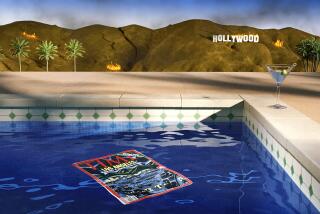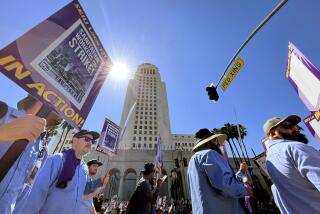L.A. Reflects, Looks to City’s Future
Los Angeles marked the anniversary of the 1992 riots on Monday with joyful multicultural celebrations and promises to work toward ethnic harmony--but also with bitter reflections on the causes of the civil unrest.
With ceremonies, concerts, exhibits, speeches and picket signs, residents considered the meaning of the violence that followed the acquittal 10 years ago of LAPD officers accused of beating motorist Rodney King--and on progress made in the decade since.
What is right with Los Angeles as well as what is wrong were both in evidence in events at the corner of Florence and Normandie avenues, epicenter of the unrest.
Even as a group of classical musicians and activists from African American, Latino and Korean communities expressed their hopes for ethnic harmony, critics charged that these efforts don’t touch the deeper problems facing their community.
“This is [just] Hollywood,” said Howard Mack, a neighborhood resident who works for a telephone company, as he watched on the sidelines.
“Nothing has changed,” he said. “Why don’t you come here at 6 o’clock, when the sun goes down, and see reality?”
Mack, along with several others, heatedly charged that despite promises of redevelopment, his neighborhood hasn’t seen any improvement.
But Rod Norris, a resident who lives four blocks from the intersection, said he was deeply moved by the event, which included the lighting of a “unity candle” and people joining hands to observe 30 seconds of silence to mark the 10th anniversary of the beginning of three days of civil unrest that shook the city.
“It was so beautiful,” said Norris, an X-ray technician. “The music brought a sense of unity that I haven’t seen in a while.”
Three violinists--Ron Clark, who is black; Jesus Florido, a Latino; and Chan-Ho Yun, a Korean American--played Pachelbel’s Canon, mesmerizing onlookers in a lot in front of a liquor store at the northeast corner.
“Los Angeles is the leader city in the U.S. with all these cultures in one place,” said Florido, an immigrant from Venezuela.
“What better way to bring people together than through music?”
Yun, a violin teacher at Colburn School of Performing Arts, also helped organize a 500-member interracial children’s choir that was scheduled to perform later Monday at Praises of Zion Baptist Church.
“Our focus should be on children,” said Loretta Jones, executive director of Healthy African American Families, an organizer of the event.
“They’re the ones who will make a difference. Adults don’t seem to be ready to take [it] on. But children will [do] anything together.”
Elsewhere in South-Central, community leaders held a groundbreaking ceremony for an $11-million commercial development on the southwest corner of Vermont and Slauson that will include a supermarket and a Burger King. The supermarket, expected to open in late November, will be one of four L.A. outlets of the Mexican-owned Gigante chain.
The project is spearheaded by the Vermont Slauson Economic Development Corp., assisted by the Los Angeles Community Development Bank and others.
Speaking at Monday’s ceremony, Councilwoman Jan Perry called the preparations leading up to the project “long and tortuous.”
“You’re not going to have any problems, because we need this project,” she said, adding that she did not expect the city to put any impediments in its way.
Also in South-Central, 80 activists gathered at Western and Slauson to protest the continuing presence of liquor stores, seen as an emblem of economic exploitation of the community.
Karen Bass, executive director of the Community Coalition, said her organization has in the years since the riots prevented many liquor stores from reopening. But she blamed the city attorney’s office, building and safety authorities and the zoning administrator for not acting forcefully enough to shut down others.
More to Read
Sign up for Essential California
The most important California stories and recommendations in your inbox every morning.
You may occasionally receive promotional content from the Los Angeles Times.










